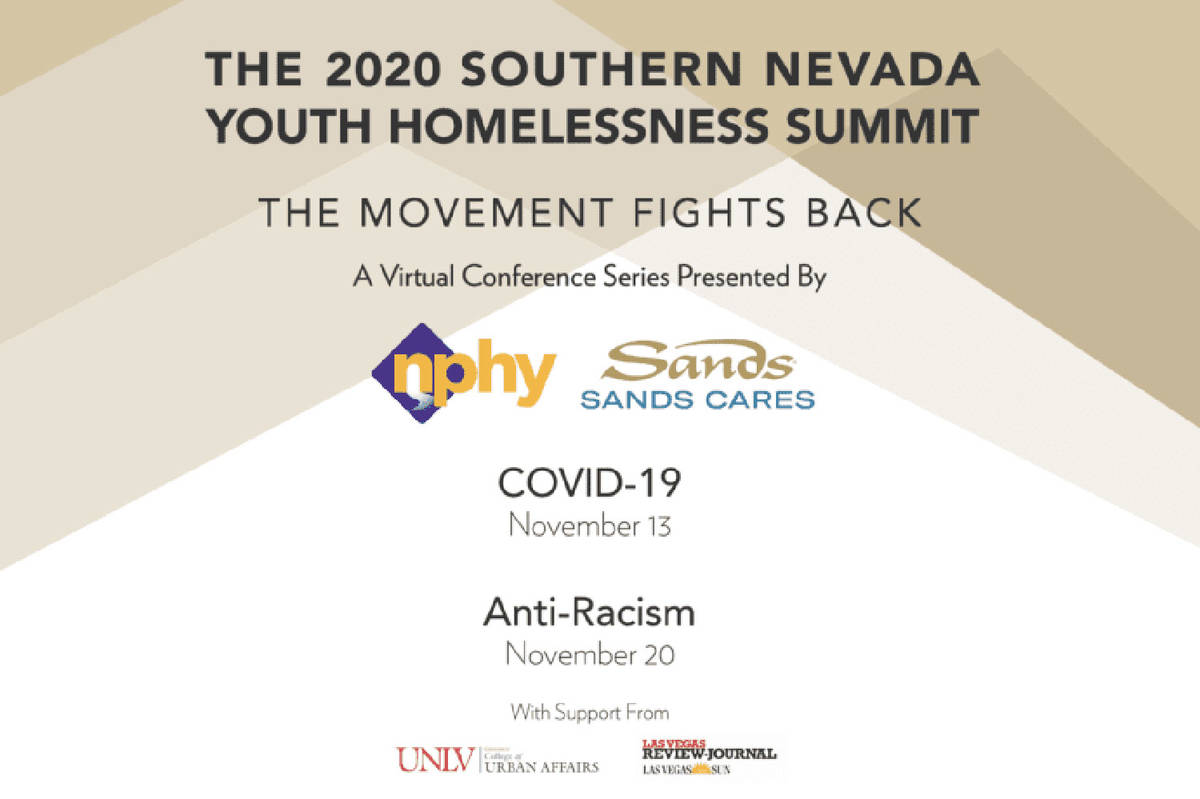Panel focuses on youth homelessness and fighting racism
A two-hour virtual panel Friday — part of the Southern Nevada Youth Homelessness Summit — focused on the impact of systemic racism in the fight to end youth homelessness.
Systemic racism has always been one of the primary causes of youth homelessness locally and around the country, said Arash Ghafoori, executive director of the Nevada Partnership for Homeless Youth.
In 2017, 52 percent of homeless youth in Southern Nevada identified as Black and 17 percent as Hispanic or Latino. Poverty alone, Ghafoori said, doesn’t explain the inequity.
Also, Clark County has the second-highest percentage nationwide of unaccompanied youth who are unsheltered, according to the U.S. Department of Housing and Urban Development’s 2019 Annual Homeless Assessment Report. Of 1,184 unaccompanied homeless youth in Clark County in 2019, 82.7 percent were unsheltered.
The fourth annual Southern Nevada Youth Homelessness Summit began Nov. 13 with a panel that included four formerly homeless youth sharing their stories and how the COVID-19 pandemic has impacted them.
The summit was presented by Nevada Partnership for Homeless Youth and Sands Cares, Las Vegas Sands Corp.’s charitable giving program, with support from the Las Vegas Review-Journal and UNLV’s Greenspun College of Urban Affairs.
Friday’s panel was moderated by Yorri Berry-Harris, director of youth partnerships for the National Network for Youth. Panelists were Javon Johnson, assistant professor and director of African American & African diaspora studies at UNLV; Marc Dones, executive director of the National Innovation Service; Kristina Ashley Williams, founder and CEO of Unpacking; and two people who previously experienced youth homelessness — Taisacan Hall and DelRio Perkins.
Panelists addressed questions such as how systemic racism has affected their lives, whose responsibility it is to dismantle it, and what efforts to address youth homelessness often miss.
“We’re going to talk about racism,” Hall said at the beginning of the discussion. “We’re going to talk about white supremacy and it’s going to get real in here.”
She said she thinks gentrification — and rents going up as a result — accounts for much of the reason Black and brown people end up homeless and are pushed out of communities. Hall also said she wanted to talk about “how systemic racism conditions you from birth.”
Dones said there’s a better shot at predicting whether someone will experience homelessness by looking at race and ethnic identity rather than income. The core driver, Dones said, isn’t the economics themselves, but rather, racist systems and principles.
The majority of people experiencing deep poverty in the United States — those making $12,000 a year or less for a family — are “majority white and that has been the case for a long time,” Dones said.
At the end of the discussion, Ghafoori said organizers expected the panel to be uncomfortable for most everyone but he noted it’s necessary to have candid conversations. He asked attendees to keep an open mind and heart, and to think about how the panelists’ insights might apply to themselves and their organizations.
The Review-Journal is owned by the family of Las Vegas Sands Corp. Chairman and CEO Sheldon Adelson.
Contact Julie Wootton-Greener at jgreener@reviewjournal.com or 702-387-2921. Follow @julieswootton on Twitter.























